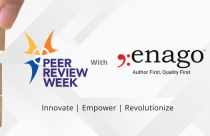New Portable Peer Review Policy and Its Effect on Academia

Academics understand the importance of publishing their work. Publications help researchers spread their ideas and gain recognition in their field. What some might not see is that there is a complex process that goes into publishing a paper. One essential aspect of the publishing process is peer review: the examination of manuscripts by other researchers and academics. Peer reviewers are responsible for the critical reading of a submitted manuscript. After this critical reading, the reviewer then suggests if the manuscript should be accepted or rejected.
The importance of peer review cannot be understated. Without this critical process, the validity of studies and ideas would be viewed with skepticism. However, there are concerns associated with the peer review process as well. For example, there are some costs associated with the peer review process. In addition, the peer review process is very time-consuming and uses a lot of resources.
BMC Biology’s Portable Peer Review Policy
The Portable Peer Review Policy at BMC Biology contains two main points. First, they offer a transfer program for submitted manuscripts that BMC Biology will not publish. The editors will suggest one or more of the BMC journals that is better suited to review and potentially publish the manuscript. During this transfer process, authors will have the opportunity to revise and update their submitted manuscript. Second, for reviewed papers, BMC Biology offers the possibility to pass on reviews and reviewer identities to editors of the other journals. The journal’s Transfers Desk runs the process. This is a service that aims to easily move the manuscript to its destination journal.
How Does Portable Peer Review Work?
Portable peer review works on the idea that in case a journal rejects a manuscript, it sends the peer review reports to other publications. Consequently, other reviewers and editors will use these reports. The benefits of the portable peer review process will remain under discussion and debate. BMC Biology was the first journal to enact a formal portable peer review policy. Its chief editor, Dr. Mirna Kvajo, feels that this process will free up a lot of time for researchers who are busy with teaching and other responsibilities.
There are three main benefits to consider:
Time
The average reviewing time is 80 days per paper. With a more transparent approach to peer review, the portable peer review process can significantly decrease the time for the review of submissions.
An Open Network
The transfer of reviews within journals made several networks within the publishing community. For example, in 2008, the Neuroscience Peer Review Consortium came into being.
Increased Peer Review Services
Authors now have more autonomy during the publication process. They can use the services of companies to take their reviewer reports with them as they look for an appropriate journal for their manuscript.
The Continued Importance of Peer Review
The process of peer review is constantly evolving. In a report done in collaboration with Digital Science, BMC offers two key suggestions for peer review in the coming decade.
- Experiment with different and new models of peer review, particularly those that increase transparency
- Work towards cross-publisher solutions that improve efficiency and benefit all stakeholders. Portable peer review has not taken off at any scale, but could make the publishing process more efficient for all involved.
What are your experiences with the peer review process? How do you feel portable peer review can be beneficial in the future to both authors and journals? Please share with us in the comments.










